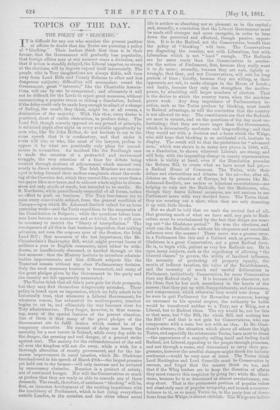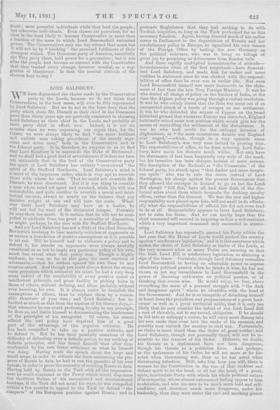TOPICS OF THE DAY.
THE POLICY OF " BLOCKING."
IT is difficult for any one who watches the present position of affairs to doubt that the Tories are pursuing a policy of " blocking." Their leaders think that time is in their favour, that the Government will gradually lose popularity, that foreign affairs may at any moment cause a diversion, and that if action is steadily delayed, the Liberal impetus, so strong at the elections, will by degrees expend itself innocuously. The people, who in Tory imaginations are always fickle, will turn away from Land Bills and County Reforms to other and less dangerous subjects ; difficulties will accumulate round the Government, great " interests," like the Charitable Associa- tions, will one by one be exasperated ; and ultimately it will not be difficult for the Lords to reject great measures, without encountering a popular storm or risking a dissolution. Indeed, if the delay could only be made long enough to admit of a change of feeling, the result, they think, might be, at all events, a diminution of the majority. With this view, every device is practised„ short of visible obstruction, to produce delay. The Land Bill, though scarcely opposed on any ground of principle, is criticised night after night on every available opportunity by men who, like Sir JOhn Holker, do not hesitate to say in the s one speech that it • is confiscatory, and that under it rants will rise, or who, like most of the lawyers, profess to oppose it by what are practically only pleas for amend- ments in committee. An incident like the Bradlaugh case is made the occasion of a protracted and envenomed struggle, the very selection of a time for debate being resisted through motions of adjournment which amount very nearly to direct obstruction. The Irish Members are encour- aged to bring forward their endless complaints about the work- ing of the Coercion Act, which they cannot like, any more than a tax-payer likes new taxes, and to exhaust whole nights in discus- sions not only sterile of result, but intended to be sterile. Sir 8, Northcote, while punctiliously respectful of all forms, makes no effort to push on business. The Tory free-lances try to raise every conceivable subject, from the general condition of Europe—upon which Mr. Ashmead-Bartlett talked for an hour yesterday week—and the Tunis expedition, to the suspension of the Constitution in Bulgaria ; while the questions before busi- ness have become so numerous and so trivial, that it will soon be necessary to restrict the "liberty of interpellation." The consequence of all this is that business languishes, that nothing advances, not even the magnum opus of the Session, the Irish Land Bill ; that measures of the last importance, like Mr. Chamberlain's Bankruptcy Bill, which might prevent losses of millions a year to English commerce, must either be with- drawn, or insufficiently discussed, or hustled through at the last moment ; that the Ministry hesitate to introduce adminis- trative improvements, and that difficult subjects like the Transvaal remain without any clear Parliamentary decision. Only the most necessary business is transacted, and many of the great pledges givon.by the Government to the party and the country are left apparently unexecuted.
The Tories think that all this is pure gain for their prospects, but they may find themselves dangerously mistaken. Their policy is based upon an impression, which we fully admit to be historically true, that whenever a Liberal Government, for whatever reason, has exhausted its motive-power, reaction begins to set in, and ultimately the way becomes clear for Tory administration. They forget, however, in thus reason- ing, many of the special features of the present situation. One of them is that many of the great pledges of the Government are to fulfil desires which cannot be of a temporary character. No amount of delay can lessen the necessity for a now tenure in Ireland, while every day adds to the danger, the pressing and real danger, of a general strike against rout. The anxiety for the enfranchisement of the soil all over the kingdom will not die away, while a wish for a thorough alteration of county government, and for the im- mense improvement in rural taxation, which Mr. Gladstone foreshadowed in his speech of March 28th—the largest promise yet held out to the farmer—will only increase and be irritated by unnecessary obstacles. Reaction is a product of satiety, not of continued hunger. Nor will the Conservatives so much as profess that they are ready or able to concede any of these demands. The result, therefore, of assiduous " blocking" will be, first, an immense development of the existing impatience with the machinery of Parliament, which is fast rising everywhere outside London, in the counties, and the cities where social life is neither so absorbing nor so pleasant as in the capital; and, secondly, a conviction that the Liberal Government must be made still stronger and more energetic, in order to bear down the perceived and effectual, though passive, opposi- tion. It is to the Radical, not the Conservative, benefit that the policy of "blocking " will turn. The Conservatives are disgusting the country, not with Liberalism, but with Liberalism which is not " hard " enough. The Radicals• aro far more ready than the Conservatives to acceler-• ate the action of Parliament, first, because they really want it to do more ; secondly, because they are sure, rightly or wrongly, that they, and not Conservatives, will rule for long periods of time ; thirdly, because they are willing, as their opponents are not, to make changes in the House of Lords ;. and lastly, because they only can strengthen the motive power, by admitting still larger numbers of electors. That is the device to which the country turns, when the machine grows weak. Any deep impatience of Parliamentary in- action, such as the Tories produce by blocking, must result, to Radical advantage, as will the conviction that the country is not allowed its way. The constituents see that the Radicals are most in earnest, and on the questions of the day most un- hesitating; that they are more eager than the Government,.
which is determinedly moderate and long-suffering ; and that they would act with a decision and a force which the Whigs, who still hope that blocking is an accidental evil, hesitate to display. The result will be that the preference for "advanced men," which was shown in so many new places in 1880, will, on a dissolution, be shown wherever Liberals are strong, and will help, with the impending change in county representation. which is visibly at hand, even if the Dissolution precedes the Reform Bill, to create what we have never had yet,— a Radical House of Commons. The Tories, with their delays and obstructions and debates in tho air—for, after all,. debates on the situation of Europe, led by persons like Mr. Ashrnead-Bartlett, are useless or injurious exereitations—are helping to ruin not the Radicals, but the Moderates, who, though they desire Liberal measures, are not anxious to see, Parliament move with very decided force. The Tories think they are wearing out a river, when they are only damming, it up with little blocks.
But we shall be told that we omit the central fact of all,. that granting much of what we have said, any gain to Radi- calism must be overbalanced by the fact that delays are wear- ing out " the Gladstone period." He won the elections, and what can the Radicals do without his eloquence and emotional, influence over the masses ? There never was a greater error..
In a Parliament like this and a Cabinet such as governs, Mr..
Gladstone is a great Conservative, not a great Radical force. Ho is, to begin with, patient as very few Radicals are. He is.
upon many subjects, such as the expediency of allowing "the.
leisured classes" to govern, the utility of landlord influence,. the necessity of protecting all property equally, the merits of indirect taxation, the value of the Establishment,
and the necessity of much and careful deliberation in Parliament, instinctively Conservative, far more Conservative•
than any Radical really is. It is because of his character, not his ideas, that he has such ascendancy in the hearts of the masses ; that they put up with disappointments, and slownesses„ and compromises, which otherwise they would vote down. If ho were to quit Parliament for Hawarden to-morrow, leaving no successor to his special sceptre, the authority he holds
would be transferred neither to a Tory, nor a Whig, nor a
Liberal, but to Radical ideas. The cry would be, not for this or that man, but " the Bill, the whole Bill, and nothing but the Bill 1" and that is not gain for Conservatives, who can compromise with a man, but not with an idea. In Mr. Glad- stone's absence, the situation which above all others the high Tories, and especially the aristocratic Tories, have most to dread —the appearance of a majority calling itself and feeling itself Radical, not Liberal, appealing to the people through promises, and not through a name, and determined to carry their pro- gramme, however the needful changes might shock the historic
sentiment—would be very near at hand. The Tories think Lord Hartington and Lord Granville must bo Conservative in
essence, and forget that the masses think so, too, and that if the Whig leaders are to keep the direction of affairs they must remove this suspicion by going far; while Mr. Glad- stone, because he is so denounced as almost revolutionary, can stop short. That is the permanent position of popular rulers not absolutely sure of popular sympathy, and to seek a counter- balance to it, as so many Tories do, in the party fear of deser- tions from the Whigs, is almost childish. The Whigs are indivi- duals ; most powerful individuals while they lead the people ; but otherwise individuals. Even classes are powerless, for no class in the least likely to become Conservative is more than a fraction of the mass to which Lord Beaconsfield entrusted power. The Conservatives may one day attract that mass, but it will not be by " blocking " the promised fulfilment of their strongest wishes. The Democrat party of America, essentially the Tory party there, held power for a generation ; but it was after the people had become so content with the Constitution that they treated every change, however needful, as a sug- gestion of blasphemy. Is that the mental attitude of the electors here to-day I







































 Previous page
Previous page